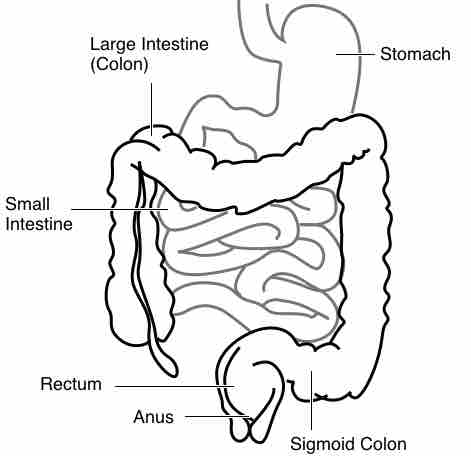The large intestine takes about 16 hours to finish up the remaining processes of the digestive system . Food is no longer broken down at this stage of digestion. The colon absorbs vitamins created by the colonic bacteria—such as vitamin K (especially important as the daily ingestion of vitamin K is not normally enough to maintain adequate blood coagulation), vitamin B12, thiamine, and riboflavin. It also compacts feces, and stores fecal matter in the rectum until it can be defecated.

Digestive Processes in Large Intestine
Image shows the relationship of the colon to the other parts of the digestive system.
Gut Flora
Gut flora consists of microorganisms that live in the digestive tracts of animals and is the largest reservoir of human flora. The human body, which consists of about 10 trillion cells, carries about ten times as many microorganisms in the intestines. The metabolic activities performed by these bacteria resemble those of an organ, leading some to liken gut bacteria to a "forgotten" organ. It is estimated that these gut flora have around a hundred times as many genes in aggregate as there are in the human genome.
Bacteria make up most of the flora in the colon and up to 60 percent of the dry mass of feces. Somewhere between 300 and 1000 different species live in the gut, with most estimates at about 500. 99 percent of the bacteria probably come from about 30 or 40 species . Research suggests that the relationship between gut flora and humans is not merely commensal (a non-harmful coexistence), but rather a mutualistic relationship. Though people can survive without gut flora, the microorganisms perform a host of useful functions, such as fermenting unused energy substrates, training the immune system, preventing growth of harmful, pathogenic bacteria, regulating the development of the gut, producing vitamins for the host (such as biotin and vitamin K), and producing hormones to direct the host to store fats.
Bacterial Flora
Escherichia coli, one of the many species of bacteria present in the human gut
Gut Flora and Specialized Digestion
Without gut flora, the human body would be unable to utilize some of the undigested carbohydrates it consumes; some types of gut flora have enzymes that human cells lack for breaking down certain polysaccharides. Carbohydrates requiring bacterial assistance in digestion include:
- certain starches
- fiber
- oligosaccharides and sugars like lactose (in the case of lactose intolerance) and sugar alcohols
- mucus produced by the gut
- various proteins
Fermentation
Bacteria turn carbohydrates they ferment into short chain fatty acids (SCFAs) by a form of fermentation called saccharolytic fermentation. Products include acetic acid, propionic acid, and butyric acid. These materials can be used by host cells, providing a major source of useful energy and nutrients for humans. They also help the body absorb essential dietary minerals such as calcium, magnesium, and iron. Evidence also indicates that bacteria enhance the absorption and storage of lipids and produce/aid the absorption of needed vitamins like vitamin K.